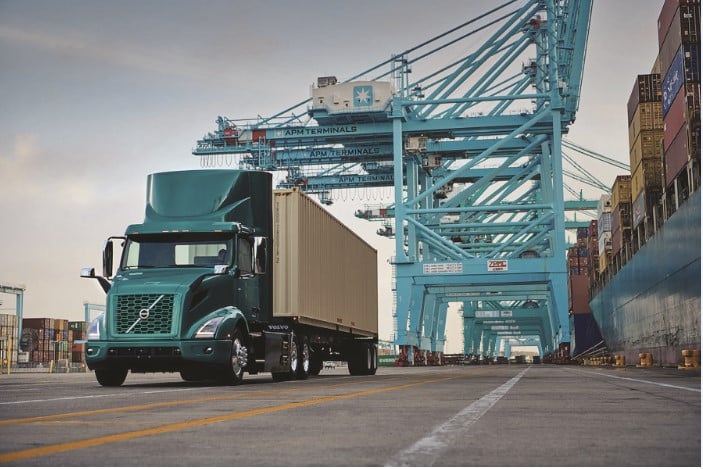El Segundo transportation startup Watt-EV recently put its grant and seed funding to use with an order of 50 Volvo VNR Electric Trucks to launch the company’s Truck-as-a-Service model in California.
The TaaS model works by making electric Class 8 trucks accessible and affordable for shippers and carriers at a per-mile rate that includes charging. WattEV Chief Executive Salim Youssefzadeh said the company’s goal is to make heavy duty electric trucks available “at a cost that’s nearly at par with diesel,” for smaller owner operators.
In addition to purchasing the electric trucks – thus alleviating the trucking firms from that expense – WattEV’s system involves the construction of three truck charging depots in Bakersfield, San Bernardino and near Long Beach.
Drivers start with a truck at a depot, secure a load at a nearby location, deliver the truck’s load to a given warehouse, then drive the truck back to one of the charging depots. There, the driver swaps the low battery truck with a fully charged one that is ready to take on the next shipment delivery.
The company’s flagship depot is its 115-acre Bakersfield location that has 100 acres dedicated to solar energy production and, at full scale, would be able to charge 200 trucks per day. The San Bernardino and Long Beach area depots will be smaller than the Bakersfield location and will primarily be operated with power from the utility power grid, according to Youssefzadeh.
All depots, which are expected to go live by the end of this year, have chargers that will provide the Volvo trucks with an 80 percent charge in 90 minutes. WattEV plans to scale its depots as its public charging network grows, eventually providing better charging capabilities that will speed up charge times.
“Volvo Trucks applauds WattEV’s unique approach to accelerating fleet electrification through its TaaS model, which aims to remove potential barriers to adoption so that fleets of all sizes can get access to electric Class 8 trucks and perform local and regional delivery with zero-tailpipe emissions,” Peter Voorhoeve, president of Volvo Trucks North America, said in a statement.
Cost differential
Large electric trucks do not come without significant investment. The Volvo trucks ordered by Youssefzadeh’s company are around $500,000 each not including taxes and fees he said, adding that Class 8 diesel trucks cost around $150,000.
“Financing of the truck is going to be a lot more (than diesel) because these assets are a lot more expensive,” Youssefzadeh said. “We expect the insurance in the long term to come down. With maintenance, we expect that to come down as well. But the energy cost is going to be much less than that of diesel, especially now with diesel prices going up.”
WattEV can reduce the price of access to pricey electric trucks for shippers and carriers with the help of its grant funds and tax credits, plus its TaaS model. The company announced in August last year that it raised $6 million in seed funding led by Canon Equity and received a $5 million grant from the California Energy Commission. The company has also been awarded incentives from the state to reduce the purchase cost of the 50 Volvo trucks it ordered. WattEV has also applied to additional grants for the remainder of its sites.

WattEV’s long term plan is to deploy 12,000 electric heavy-duty trucks on California roads by 2030.
“We saw this as an opportunity and as a challenge to see how we can take these trucks and make them more affordable and accessible to users at a cost that’s nearly at par with diesel,” Youssefzadeh said, noting that the company will actively work to develop the model as it is put in action this year.
The company is betting heavily on the increased adoption of electric vehicles in California, a state that has implemented several emission-conscience laws and encouraged the use of electric vehicles. For example, the state has an objective to have five million zero-emission vehicles on the road by 2030 and 250,000 electric vehicle charging stations by 2025 as directed by a state executive order.
What will be interesting to watch, according to Amir Gharehgozli, an associate professor at California State University – Northridge’s David Nazarian College of Business and Economics, is how well the startup will mesh with other states if it can expand its infrastructure.
“The gamble being taken is a very realistic gamble and they need to think about it. Maybe (it could work) in California, but in other parts of the country, that’s going to be tougher, such as Texas or the Midwest,” Gharehgozli said.
Texas, like California, has rebates for owning electric vehicles, but ranks poorly on a transportation electrification scorecard published by the American Council for an Energy-Efficient Economy last year. Texas is ranked at No. 27 out of 29 in the scorecard, indicating the state has taken minimal steps to prepare infrastructure to support more electric vehicles.
Gharehgozli added that WattEV will need to keep its eye on securing a return on investment on the trucks they are procuring through consistent usage and maintenance. The company has already reserved 50 Tesla Semis in addition to its Volvo order.

Also, WattEV plans to run its own fleet of 50 heavy-duty electric trucks by the end of this year, deploying under contract with several Southern California fleet customers and owner operators. Some of the trucks will be initially deployed under WattEV Transport, the company’s own transport company.

